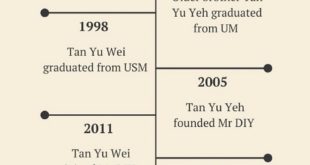
Author’s Blurb: Recently we got news that Offpeak had ceased operations, so we reached out to co-founder Lau to learn what went wrong. He was brave enough to lay it out in detail (and we’re thankful for that), so hopefully the lessons learnt are ones that startups in similar positions could benefit from.
Offpeak was a Malaysian online platform and app launched in 2014 that let you make restaurant bookings and secure discounts.
In our last proper interview with them in 2016, they had expanded into 3 other countries: Singapore, Thailand, and Vietnam.
They were boasting over 2,600 partner restaurants across 4 countries, and had received prior funding from Cradle Fund, Gobi Partners and YJ Capital (Yahoo Japan’s VC arm).
But now, they’ve shut down Offpeak’s operations in all 4 countries, so we reached out to co-founder Lau for some insight into the reasons behind why.
Early Success Determines Little
What Offpeak had aimed to do was build a product whose value proposition satisfied both the supply (vendors like restaurants) and demand (diners) of the market.
“We felt that we could create a platform that can ease restaurants into dynamic pricing model as opposed to the traditional 1 menu and 1 price at all times of day, which we felt was outdated as the demand curve is drastically different from hour to hour each day,” Lau told Vulcan Post.
In short, they wanted to help a generally fragmented and imperfect age-old F&B industry by helping consumers find the best food and restaurants to have an affordable marketing platform.
The initial powerful take-up rate they experienced on both the supply and demand side indicated a somewhat strong product market fit (PMF), Lau recalled.
Furthermore, they were able to demonstrate high profit gross margins at an early stage of the business on a small sample size. However, it was ultimately not enough to secure subsequent funding to continue growing the business.
Then came the ‘funding winter’, a point where startups (early-stage ones in particular) were finding it near impossible to gain any funding.
Offpeak was already struggling between balancing high growth (and ironing out operational inefficiencies later) or achieving operational efficiency (while sacrificing exponential growth).
At that point, they then had no choice but to pursue the latter despite aiming for the former initially.
“Unfortunately, it was not successful as we weren’t of a sufficient size to take advantage of network effects nor had the economics of scale to demonstrate operational scalability,” Lau said.
Unexpected Competition
When Offpeak was still active, they had semi-direct competitors that they were aware of like Fave and Eatigo.
But that wasn’t troubling, because Lau and the team felt that they all helped in educating the market. They were even beneficial in that sense.
What changed the landscape before Offpeak was ready, however, was actually the rise of digital payment platforms like GrabPay and WeChat Pay that began fuelling their growth by subsidising promotions previously borne by restaurants themselves on Offpeak.
“While we always wanted to move into digital payments ourselves in partnership with these payment platforms, we weren’t ready when they arrived due to the earlier minor business adjustment (better operational efficiency),” Lau lamented.
That was the point of realisation where Offpeak knew their business could no longer be sustained. Despite the catalyst of positive industrial changes in the form of digital payment platforms arriving, the team just wasn’t in the position to profit from it, both financially and in terms of scale.
To make matters worse, Offpeak was trying to raise Series B funds when the ‘funding winter’ hit and VCs became more risk averse, so despite being impressed by their high growth rate, the VCs wanted them to demonstrate higher sales to accompany their growth.
“At our early stage, we were only able to demonstrate one or the other, but not both at the same time. I personally felt the unfortunate timing of the funding winter proved to be our undoing,” stated Lau.
When I asked if they had ever considered a pivot before shutting down completely, he replied that there wasn’t an obvious ‘better’ business model to pivot to and that they weren’t the gambling sort to change for the sake of changing, in hopes of striking gold.
He felt that their PMF was quite solid, and that they merely needed more scaling to eventually demonstrate profitability.
There’s Always A Takeaway
With so many restaurant partners across a few countries, I wondered what they had to take into consideration before shutting down.
“Fortunately, we were low CapEx model and we didn’t hold any of our partners’ money. Diners paid the restaurants directly and we merely facilitated the transactions,” Lau said.
Dictionary Time: Capital expenditures (CapEx) are funds used by a company to acquire, upgrade, and maintain physical assets such as property, buildings, an industrial plant, technology, or equipment. It’s any type of expense that a company capitalises, or shows on its balance sheet as an investment, rather than on its income statement as an expenditure.
“When we closed, we received many messages expressing their sympathies, but we did not close the business leaving a hole in accounts payable.”
Reflecting on what they could have done better, Lau said, “Either growing faster and raising more capital or aiming for operational profitability from the start. Mixing them both or changing the strategies before we were ready was a challenge too far for us.”
On a personal level, he shared that he learnt a lot in terms of shareholders management, building MVPs, recognising PMF on a deeper level, determining and executing operations scalability, and taking better advantage of good timing (referring to how they raised their Series B too late).
“As for the F&B business, the landscape is changing drastically, in terms of digital payments, procurement platforms, etc.” Lau observed.
Thus, here was his parting advice: “I feel restaurants should focus on their core business (providing good food and excellent service) and embrace partnerships with digital payments.”
Bottom Line: Lau’s sharing was humbling, and to someone like me who doesn’t run a startup and never intends to, this assured me that I’m making the right choice. I’m just not equipped to deal with all the uncertainties of business, but Lau has already moved on to working with hospitality startup LiveIn. We wish him and the rest of the Offpeak team all the best in their new endeavours!
- You can read what we’ve written about Offpeak before here.
Featured Image Credit: Offpeak



